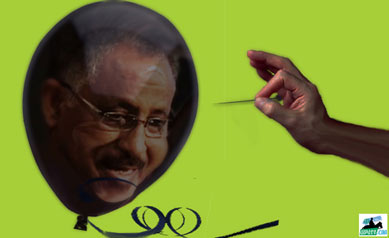“This Too Shall Pass”: Time For Real Outrage

According to Abrahamic religions, the Sinai Peninsula (and Jebel Mussa or Mount Moses), is where God gave Moses the Ten Commandments, the first set of rules of ethics and worship that still shape the moral values of much of humanity. One of the commandments is Thou Shalt Not Kill, (according to other translations, you should not kill unlawfully or you should not murder).
Moses is believed to have escaped from Egypt to Sinai after “killing an Egyptian overseer who had beaten a Hebrew slave.” He must have been outraged by the killing of the slave that he decided to avenge his death and escape. The bible tells us that Moses remained in Sinai for “forty days and forty nights” (Ex.24:18) before receiving the Ten Commandments. Some of the Eritrean refugees, victims of human organ traffickers, could have been jailed by the smugglers for forty days before they met their fate. They certainly didn’t escape to Sinai after avenging the death of their compatriots who were killed by the PFDJ brutes; they were just fleeing from the Eritrean regime’s hell, they were escaping the indefinite forced labor imposed on them, they were escaping the suffocating situation that the regime has imposed on Eritrea since 1991.
Since Eritreans have been repeating the above phrase for so long, we think we created it and others just copied us. In reality, the fable is so ancient; it “appears in the works of Persian Sufi poets, such as Sanai and Attar of Nishapur.” Recently, Eritreans were reminded of its profundity and it has enraged even those who have a small fiber of conscience left in them. It enraged us because a victim, who might have lost his life, scribbled it on the wall of a cave in the Sinai Peninsula.
The Story Behind The Story
Eritreans have been escaping their country since 1967 when the late emperor of Ethiopia unleashed a scorched earth policy on the country, especially on the Western region. The first batch of refugees were gathered on makeshift camps in Eastern Sudan. Since then, the camps have grown to dozens and the number of Eritreans residing in those camps and elsewhere in Sudan has grown to the hundreds of thousands. Equal number of other refugees used the Sudan as a transit station and ended up in the Middle East, Europe, North America and Australia. There is hardly a region in the world where there is no Eritrean refugee. A morbid joke by refugees, in the tradition of Abyssinian “gold and wax”, goes like this: There are Eritreans in all parts of the world except in Eritrea. For Eritreans, it appears that the guiding philosophy is “Just when you think things can’t get worse, they do,” and this, I fear, might have dulled our ability to be outraged.
The cause of the exodus was supposed to have come to an end in 1991 when the Eritrean land was liberated; but fate would have it otherwise. The liberators turned to ruthless rulers and, as a result, not only could the refugees not return, new wave of refugees started to flee the country to avoid the indefinite forced labor that the youth are subjected to by the regime. Beginning from 2001, taking advantage of the world’s preoccupation with the aftermath of 9-11, the regime heightened its suffocation mechanisms that started in 1991, and continued to oppress the people with impunity: escaping the country became the goal of most able-bodied Eritreans. Today, Eritreans are feeling to Ethiopia and tens of thousands of them are being housed in several camps in a country that was supposed to be the enemy of Eritrea. Both Sudan and Ethiopia have become transit stations for Eritreans pursuing a goal of making it to the safe havens of the West.
All Eritreans are forced by law to complete their senior high school year in a military camp, they are drafted to the army and are supposed to stay in service indefinitely. Many escape to avoid the life of servitude and being subjected to forced-labor building roads and other construction work with no pay. Since the Eritrean regime gives citizens neither passports nor exit visas, and leaving the country is illegal, the outcome has been two: be the victim of the standing shoot-to-kill order given to the border guards, or, if you make it out, become a victim of the lucrative human smuggling racket which has developed. Also, since all aspects of economic life, including transportation, is monopolized by the regime and its top brass army personnel, the smuggling business is run by top army officers who charge thousands of dollars to smuggle people across the border to either Sudan or Ethiopia—the Ethiopian border is more expensive since it is militarized and is not as open and as sparsely populated as the deserts bordering Sudan and Eritrea.
Tit-for-tat of Tyrants
Al Bashir of Sudan and Isaias of Eritrea have been playing their favorite games to save their grip on power at the expense of the Sudanese and Eritrean people. Their unhinged pursuit of power has been the cause for the lose of tens of thousands of lives in the region. Both tyrants have learned and inherited the art of using the people as pawns and gambling with their lives, from their predecessors: the corrupt regimes of General Abboud and General Numeiri in Sudan, and Haile Sellasie and Menghistu who ruled Eritrea.
The Eritrean regime has been blackmailing the Sudanese regime since 1995 and it has hosted several armed opposition forces in Eritrean territories. The Southern Sudan rebels trained and operated out of Eritrea before gaining independence last July. The Eritrean regime also organized and unleashed rebels opposing the Sudanese regime from the East and finally pressured Al-Bashir into a deal that was brokered in 2006. That deal brought about an Eastern Sudan regional government loyal to the Eritrean tyrant. The deal brokered by the Eritrean tyrant also imposed the appointment of his loyalists to the Federal government in Khartoum—one of them holds a ministerial portfolio.
Having gained enough leverage in Sudan, and particularly in the Eastern region that borders Eritrea, officers of the Eritrean regime expanded their network and recruited dozens of Sudanese security personnel in the region, particularly in and around Kassala. They further expanded their business of smuggling goods to and from Eritrea and mainly human trafficking of Eritrean youth to Sudan.
Once in the Sudan, Eritrean escapees are subjected to blackmailing—they should either pay hefty ransom money or be returned to Eritrea. If the escapees are returned to Eritrea by the Sudanese security officers, they are subjected to a military tribunal and accused of desertion—which is considered treason—and they could face a death sentence.
Over the last decade, hundreds of Eritreans who were deported back to Eritrea from Sudan have disappeared. Hundreds more deported back from Libya and Egypt faced the same fate. Hundreds more are currently held in Aswan, Egypt, to be deported back to Eritrea.
Evolution Of A Racket
The dire situation in Eritrea, the cruel governance and absence of a constitutional government, rule of law, the non-existence of civil space, and the monopoly of business by the regime, has created a fertile ground for human trafficking. Smugglers are now more sophisticated and have expanded their network internationally. In the process, the smugglers and traffickers have discovered the porous borders of Israel with the Sinai Peninsula that became a preferred route to smuggle Eritreans who didn’t know what the smugglers had in mind for them. Refugees became cover-up for arm smugglers. Soon the smuggling business was expanded to include human organ trafficking; but it was not immediately known that mainly Eritreans and other Africans will be the victims of the criminal organizations.
If you want clarity, if you don’t want to mince words, the answer is simple: All evil and all suffering was unleashed on Eritreans because of the monstrous ruling regime in their country. Some distressed Eritreans have been spewing their rage at the Rashaida, a tiny Arab Bedouin tribe that lives in Eritrea and Sudan. Though the Rashaida have been traditional goods “smugglers” (smuggling is in quotes because for traditional societies borders mean nothing), it is worth mentioning that they have been the target of blanket stereotyping based on primordial prejudice by some writers from the region. But the racket of refugees, arm smuggling and human organ trafficking is big and it has certainly attracted many other people beside the Rashaida tribesmen who are employed by Isaias and his clique.
The racket certainly involves people high up in the regimes of Sudan, Eritrea and other establishments who cash on the lucrative business. Like any gangster enterprise, they all have an interest in promoting the trade and perpetuating it. The Eritrean regime which is run by the Isaias clique denies people the freedom of movement and liberty, and, just as importantly, the ability to dream of a better future. The youth are supposed to “sacrifice” their dreams and aspirations so that future generations of Eritreans (and their immoral contemporaries in the Diaspora and the other assorted tourist Eritreans) can reap the fruits of their free labor. They are supposed to work for free constructing roads and hotels in deserts so that the YPFDJ types and their equally clueless and immoral countrymen visiting from the West can say “there is a lot of infrastructure development in Eritrea.” In such a situation the youth has no other choice but to sneak from the country in any way possible, thus, they are exposed to all the risks of suffering and death. Had Eritrea been free, not as many people would be continuously thinking of means to escape from it.
The foreign connection of the Eritrean and Sudanese racket became lethal probably when big money and international elements began to collaborate with it.
The international audience was exposed to the human organ trafficking on August 17, 2009 when the Swedish Journalist Donald Bostrom, the same journalist who carried an interview with the Eritrean tyrant Isaias Afwerki around the same time, reported on the Swedish ‘Aftonbladet’ a story under the title “Our sons plundered for their organ” (translated by Tlaxcala.) It was around the same time that Eritreans became alerted of the situation as well. Since then, the news has gotten more gruesome by the day.
On October 31st 2011, PressTV carried a news item: An Israeli rabbi who was involved in organ trafficking to the US pleaded guilty for breaking law.
A rabbi is now retailing kidneys in New Jersey, and it is brought from Israel?
According to a medical doctor interviewed by a news service, under a normal situation, a kidney can stay good for about three days with proper storage and fast transportation. Sinai is in Egypt and the refugees who reach there are heading to Israel. The organs extracted from the Eritrean victims cannot reach its destination unless it crosses Egypt or Israel. There is no way that human organs can be transported through any other country except through the two countries before reaching the final destination where recipients pay hundreds of thousands of dollars. Certainly New Jersey seems a perfect market. It is very likely that those kidneys taken from Eritrean victims are ending up in the USA. And according to reports, the despicable rabbi and his associates have pleaded guilty to falsifying documents and selling kidney brought from Israel and given to recipients in the USA. Could we say that now, the big money involved has a face?
A few days ago, an Egyptian news outlet published a graphic coverage of the plight of refugees who ended up becoming involuntary organ donors: They were killed and unceremoniously buried after some of their body organs were taken out. Of course, there is no government to claim the bodies of the Eritreans that are being buried everywhere, or of those kept on morgues in Egypt: The Eritrean regime would be too noble if it even thought of that. That regime has no sympathy for those who reject its rule and escape from the hell it created. On March 2010, Fasil Ghebrselassie, the Eritrean Ambassador to Egypt told Almasry Alyoum that “any person who is a fugitive from his country does not enjoy any rights.”
In an interview on October 21, 2009, responding to a question on why Eritreans were escaping their country, Isaias Afwerki, the president of the Eritrean regime told Reuters that, “They are going for a picnic. They will come back one day.”
More recently, a regime supporter (YPFDJ, of course) stated on AlJazeera TV that the refugees were leaving Eritrea in pursuit of Air Jordan sneakers, iPods, and other goodies available in the West (17:39 mark).
The Egyptian website’s graphic report showed caves where the victims stayed for weeks and maybe months, before they escaped death or were killed and their body organs harvested. Living in the caves, in a desolate desert location surrounded by cliffs and dunes, they left messages that they wrote with charcoal on the walls. The reporter could not make the language and questioned if the writing was Hebrew letters. Not Hebrew, it was written in Geez letters, a script used only in Eritrea and Ethiopia. Some of the refugees wrote their names, nicknames and towns they came from. One wrote, “In God we trust”. But the most profound of the messages was a scribble high on the cave wall: “This too shall pass.”
Did it pass for him? There is no way of telling. Maybe it did. Or maybe he was one of those who were killed after his kidney was taken away crudely, maybe butchered with a kitchen knife.
I threw up watching an unidentified body being turned over and over to check the tell-tale scar on his lower back, an obvious cut to extract his kidney. A snooze was still fastened around his neck. Maybe they suffocated him. Maybe the monsters took his kidney while he was still alive and then unceremoniously dumped him in a shallow grave and covered his body with desert sand.
That summons serious rage.
Researching the subject, I also came across yet another Egyptian report on www.youm7.com. There I also found a youtube clip of some recovered corpses stored in a morgue in AlArish, Egypt.
In normal circumstances, I would not encourage people to see such gruesome graphic scenes in my column, but this is my way of showing my outrage, I need every human being, let alone Eritreans, to be outraged. I would like Eritreans to be outraged and focus on the root causes for all of this misery. Why should a nation suffer so that a few corrupt monsters can enslave its people? Doesn’t the regime deserve the fate of its late patron the madman Kaddafi?
Resistance Is The Word
Years ago I heard that people can develop resistance to almost anything. Pain ceases to be pain after repeated experiences. If someone is given poison, in tiny microscopic doses that is gradually increased, overtime, the body can be immunized. To me that is circus stuff; I am not for passive resistance. I care less what people do in laboratories on their own. I care more on what is forced on victims, when they cannot resist to protect themselves. I have grown up being outraged by injustices, by brutality, but I am not prepared to see such a sheer monstrous cruelty of the proportions of what happened and is happening to Eritrean youth. This calls for a serious resistance; forget opposition, it is a lame word describing a lame action.
This week, my outrage has surpassed any outrage I ever had. Time For Real Outrage. I hope that Eritreans have not become so immune to barbarity that they are not outraged anymore! I hope Eritrea has not become a nation of mourners and wailers. They should think beyond the Internet and facebook wailing, which is supposed to be a means to resistance and not a goal. What tangible action can be taken beyond the usual “please pay attention to the suffering of our people”, letters sent to international entities?
Two years ago, no Eritrean would have thought that the future victims of human organ traffickers would be Eritreans escaping the hell that Isaias and his clique created. No one would have thought our youth will be the 21st century’s cavemen writing their names on cave walls for posterity, a few words showing that a human being suffered on that spot. We must be outraged. First the outrage, then the corresponding action.
Related Reading:
http://www.ynetnews.com/articles/0,7340,L-4005541,00.html
https://awate.com/eritrean-refugees-kidnapped-tortured-in-egyptian-sinai/




Awate Forum